On 19 October 2021, cold chain experts conducted a virtual summit for African policymakers and business leaders to explore sustainable solutions to help keep farmers’ produce fresh and get it to market quickly and efficiently – reducing food waste, boosting profits and creating jobs.
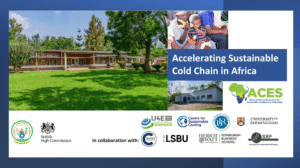 The online event on Accelerating Sustainable Cold Chain in Africa highlighted the latest developments of the African Centre of Excellence for Sustainable Cooling and Cold-chain (ACES). In addition to helping farmers and agribusinesses reach new markets, ACES is a boon for vaccines and the health and well-being of consumers – as it brings together multi-disciplinary experts who have a shared interest in reliable, affordable and sustainable refrigeration and related best practices.
The online event on Accelerating Sustainable Cold Chain in Africa highlighted the latest developments of the African Centre of Excellence for Sustainable Cooling and Cold-chain (ACES). In addition to helping farmers and agribusinesses reach new markets, ACES is a boon for vaccines and the health and well-being of consumers – as it brings together multi-disciplinary experts who have a shared interest in reliable, affordable and sustainable refrigeration and related best practices.
Hosted by the British High Commission and Rwanda’s Ministry of Environment, the event was supported by the Centre of Sustainable Cooling, United Nations Environment Programme’s United for Efficiency (U4E), and the University of Rwanda, with a range of additional contributors.
With significant initial funding investment from the UK Government and in-kind support by the core partners of ACES, the Centre is poised to begin operations next year. The headquarters is hosted at a campus in Kigali allocated by the University of Rwanda, backed by a high-level team and subject matter experts.
The summit informed the more than 100-strong audience of the latest developments at ACES Headquarters in Kigali and the affiliated Living Laboratories anticipated throughout the continent to scale-up adoption of sustainable cold chain solutions. There are ongoing close discussions with Defra regarding further funding to build on early investment and activities.
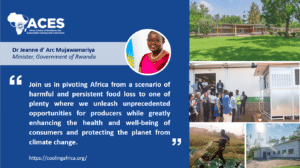 Rwanda is one of the least urbanised countries in Africa with 73% of the workforce employed in agriculture. In sub-Saharan Africa, 54% of workers rely on the agricultural sector. A further challenge is that agriculture in Rwanda is dominated by six million small and marginal farmers, on average each farming less than 0.6 hectares of land.
Rwanda is one of the least urbanised countries in Africa with 73% of the workforce employed in agriculture. In sub-Saharan Africa, 54% of workers rely on the agricultural sector. A further challenge is that agriculture in Rwanda is dominated by six million small and marginal farmers, on average each farming less than 0.6 hectares of land.
High Commissioner Omar Daair noted, “Climate change is the greatest challenge facing the world today, and agriculture is vital to the livelihoods of so many Rwandans and to economic development across Africa. I’m really excited to see how this partnership of world leading experts from the UK, Rwanda and beyond will find solutions to the challenge of sustainable cooling. And I’m proud that this is being spearheaded right here in Kigali with support from the UK.”
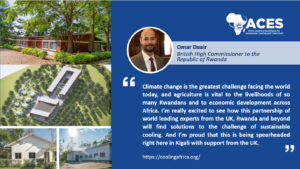 Brian Holuj, ACES project co-developer, UNEP U4E noted, “ACES is instrumental in orchestrating the requisite collaboration on R&D, capacity building, awareness raising, deployment, and investment of market-appropriate solutions for sustainable cooling and cold-chain systems . This pan-African initiative will accelerate the roll-out of affordable low carbon emission cooling and cold-chain systems, while supporting Africa’s social and economic goals.”
Brian Holuj, ACES project co-developer, UNEP U4E noted, “ACES is instrumental in orchestrating the requisite collaboration on R&D, capacity building, awareness raising, deployment, and investment of market-appropriate solutions for sustainable cooling and cold-chain systems . This pan-African initiative will accelerate the roll-out of affordable low carbon emission cooling and cold-chain systems, while supporting Africa’s social and economic goals.”
ACES supports Rwanda’s National Agricultural Export Development Board’s (NAEB) five-year strategy to double agricultural exports by 2024-25 and significantly increase exports of aqua-culture, beef and other temperature sensitive products, and it is supportive of the African Union’s Agenda 2063 and related sustainable development targets by countries throughout the continent.
At the same time, the work will not only contribute to supporting the efficient and equitable delivery of COVID-19 vaccination, but also design solutions that can contribute to long-term cold-chain and energy resilience with a lasting legacy.
In a world where climate change has a negative impact on food cycles, intensifying food production alone is no longer a viable solution to respond to the emerging food demand Mitigating food loss will be key to food security.
For more information on ACES, click here to download the ACES brochure, or to find out how to get involved as an ACES partner, click here.
Leave a Reply